You have a large number of issue, Undefined Behavior being the most critical:
n -= 1;
for(i=0;i<=n;i++)
{
b[i]=a[n-i];
}
When i == n, you index one beyond the end of your b[] array. All arrays in C are zero-indexed, so your loop limits are 0 <= i < n. By using i<=n you loop one-too-many times.
You fail to check the return of any user-input. Try entering '"one"', or accidentally hitting 'r' instead of 4 and see what happens. You must check the return for every user-input and handle the error. What happens if the user enters 1, 2, 'r', 5? You must also empty stdin of any extraneous characters or they will bite you again on your next input.
Don't use conio.h. That makes your code 100% non-portable. You can use the functions in stdio.h for your needs.
That said, when you need to do repetitive tasks like taking integer input, write a short function to do it. You can write one that takes a pointer to the integer to fill, and a pointer to the prompt to display and returns 0 on success or -1 if the user cancels input by generating a manual EOF with Ctrl+d on Linux or Ctrl+z on windows. You can add a helper-function to empty stdin, e.g.
void empty_stdin (void)
{
int c = getchar();
while (c != '\n' && c != EOF)
c = getchar();
}
int getint (int *n, const char *prompt)
{
int rtn;
for (;;) {
fputs (prompt, stdout);
rtn = scanf ("%d", n);
if (rtn == EOF) {
fputs (" (user canceled input)\n", stderr);
return -1;
}
else if (rtn == 0) {
fputs (" error: invalid integer input.\n", stderr);
empty_stdin();
}
else
break;
}
empty_stdin();
return 0;
}
The rest of your program to read an array in a[] and reverse it in b[] is simply:
int main (void) {
int i = 0, n;
if (getint (&n, "Enter array parameter: ") == -1)
return 0;
int a[n], b[n];
for (i = 0; i < n; i++) {
char buf[128];
sprintf (buf, "enter value for a[%d]: ", i+1);
if (getint (&a[i], buf) == -1)
return 0;
}
for (i = 0; i < n; i++)
b[i] = a[n - 1 - i];
puts ("\nvalue of array b[]:");
for (i = 0; i < n; i++)
printf (" %d", b[i]);
putchar ('\n');
#if defined (_WIN32) || defined (_WIN64)
getchar(); /* hold terminal open on windows - type any char, hit return */
#endif
}
Example Use/Output
All valid inputs:
$ ./bin/getarray
Enter array parameter: 5
enter value for a[1]: 5
enter value for a[2]: 4
enter value for a[3]: 3
enter value for a[4]: 2
enter value for a[5]: 1
value of array b[]:
1 2 3 4 5
Errors in input:
$ ./bin/getarray
Enter array parameter: foo
error: invalid integer input.
Enter array parameter: 5
enter value for a[1]: 5
enter value for a[2]: four
error: invalid integer input.
enter value for a[2]: 4
enter value for a[3]: 3
enter value for a[4]: I'm getting tired of this game...
error: invalid integer input.
enter value for a[4]: 2
enter value for a[5]: 1
value of array b[]:
1 2 3 4 5
User cancels input:
$ ./bin/getarray
Enter array parameter: 5
enter value for a[1]: 5
enter value for a[2]: 4
enter value for a[3]: 3
enter value for a[4]: (user canceled input)
Look things over and let me know if you have further questions.
